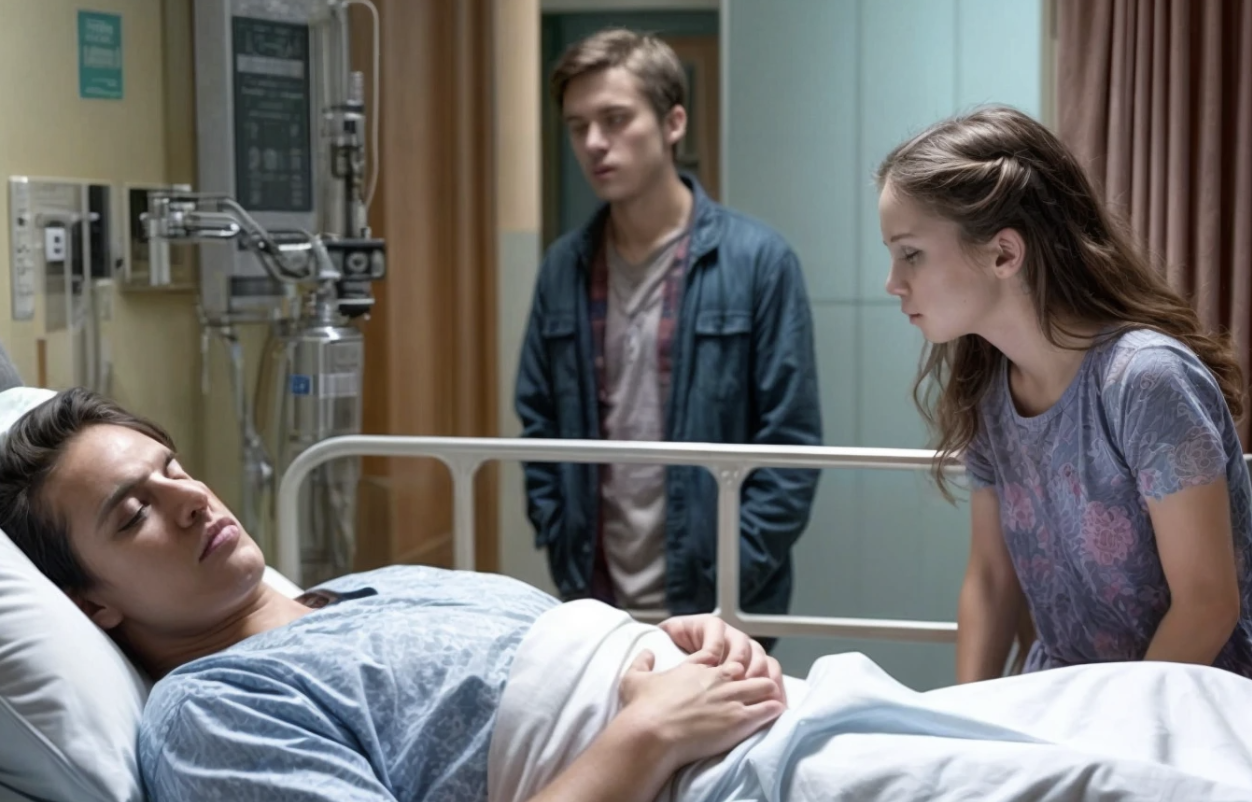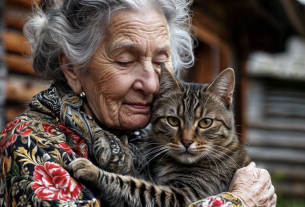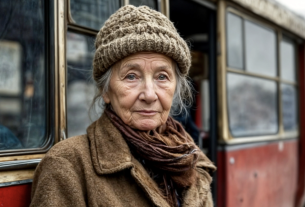Evening flooded the kitchen with warm, thick light, like spilled honey slowly dripping down dusty windows. The room was simple but impeccably clean, shining after cleaning. The air carried the scents of yesterday’s borscht and something childlike—a mix of paper, pencils, and innocence. Margarita, a thirty-four-year-old woman with a tired gaze and a slight shadow of worry in her eyes, buttoned up her worn coat. Her daughter, seven-year-old Alyona, sat at the table, resting her cheek on her fist, intently flipping through a thick book that had not a single picture.
“Mom, did you know octopuses have three hearts?” she suddenly asked without looking away from the text. “It would be great if you had three too. One for me, the second for work, and the third just so you could rest.”
Margarita smiled. This fragile girl with a serious, almost adult gaze was her support, a beacon in the stormy sea of loneliness. The father—the subject they touched on rarely and always the same way: “he left and got lost.” Once said in a moment of despair, it became their family legend, convenient and understandable.
Since then, it was just the two of them—against everyone and everything. During the day, Margarita cleaned hospital wards in a district hospital, doing hard, low-prestige janitor work. At night, when Alyona fell asleep, she sat down at her laptop and translated dry technical documents, fighting fatigue and the feeling that life was passing her by.
“Well, my little thinker, ready?” Margarita adjusted her daughter’s hat, smoothing the stray strands.
“Ready,” Alyona sighed, closing the book. “Mom, don’t you think you should take a closer look at Uncle Valera? The plumber. Yes, he smells like oil, but he fixes everything. And he has a mustache like the cat from that cartoon.”
“Alyona, enough,” Margarita smiled gently.
“Well, what? I just want you to be happy. Uncle Valera is not an option, okay. What about the mailman? He smiles at you every day!”
Margarita shook her head, holding back laughter. Recently, Alyona had “checked out” every man in the neighborhood, but none passed her internal “worthy to be dad” test. And again, like yesterday and like tomorrow, they left the house together—Margarita for her night shift, and Alyona to the tiny utility room next to the medical station, because there was no one else to leave her with.
The hospital greeted them with its usual atmosphere—dim light, antiseptic smell, whispering footsteps down the corridor. In the semi-darkness, Margarita ran into Sanya—a twenty-three-year-old nurse with a lush red fringe and a perpetual smile. She dreamed of becoming a surgeon and worked at the hospital to pay for her studies.
“Rit, hi! Have you heard about the new patient in Ward Five?” she whispered quickly. “Dmitry Sergeyevich, some rich businessman. In a coma after a car accident. And his wife Marina—she’s a nightmare! Perfumed, dressed like she’s on a runway, but crying as if her heart is breaking. All fake, just fake.”
Margarita nodded, thanked her for the info, and took Alyona to their temporary refuge—a tiny closet behind the mops where an old sofa stood. The girl settled on it with her book, but today she didn’t want to read. The letters swam before her eyes, and the hospital silence pressed down. The pencils stayed home, and that was the last straw. Sighing, Alyona jumped off the sofa and tiptoed off to look for her mom.
On the way, she passed by Ward Five. The door was ajar, and a quiet female voice came from inside. Curiosity won over caution. Alyona slipped inside and hid behind a medical screen. On the bed lay a man wrapped in wires and tubes. Nearby stood a woman—elegant, with a flawless hairstyle and an expensive coat. It was Marina herself. Alyona froze, holding her breath.
“Well, dear, are you sleeping?” the woman whispered, her voice without a trace of sorrow, only cold calculation. “Soon you will leave forever. And I will finally be free… and very rich. Just a little longer to wait.”
Alyona watched in horror as the woman took a syringe from her purse and injected liquid into the IV line. The girl’s heart pounded as if trying to burst out of her chest.
Marina hid the syringe, adjusted her hair, and in the next moment her face changed. Her lips trembled, tears filled her eyes. She left the ward, sobbing loudly and pressing a silk handkerchief to her face, pretending to be a grieving widow in front of a passing nurse.
On the way home, Alyona was silent. She sat by the window on the bus, staring into the darkness, her eyes usually lively and curious now dull and sad. Something inside broke. For the first time, she saw evil not in a fairy tale or a book, but in reality—cold, ruthless, disguised as grief. Margarita immediately sensed the change.
“Alyonushka, what happened? Why are you so quiet?” she asked when they entered the apartment.
The girl silently took off her shoes, went into the room, and sat on the bed. Only after much coaxing did she, trembling and sobbing, tell what she had seen. Her words were confused and childish, but panic was clear.
“…she said he would die, and she would become rich… and she put something into the tube, mom… I saw everything…”
At first, Margarita wanted to calm her daughter: “It’s a dream, a bad dream, you’re just tired.” But Alyona described everything with frightening accuracy—the syringe without a needle, how the woman injected the liquid into the IV port, even how her face changed after the crime.
Margarita froze. Doubts vanished. Her daughter’s gaze did not lie. There was horror, but not fantasy—the horror of a person who had witnessed something unbelievable. The mother didn’t know what to do, but one thing was clear: she could not stay silent.
The next day passed in anxious thoughts. Should she go to the police? But who would believe a child? They might think she was imaginative, and Margarita—crazy. Then she remembered. In her youth, before marriage and motherhood, she was into tourism. Somewhere in the attic, in an old box, was a small action camera—a gift from her ex-husband.
In the evening, before her shift, Margarita found it, charged it, and hid it in her coat pocket. At work, when silence fell in the corridor, she quietly entered Ward Five and hid the camera on a shelf among boxes of medicines, pointing the lens directly at the patient’s bed. Her heart raced—out of fear, but also hope.
Alyona knew about the plan. When, near midnight, the sound of heels echoed, she realized Marina was here again. The woman entered the ward, looked around, and took out a syringe. At that moment, Alyona decisively stepped into the doorway.
“Auntie, have you seen my mom?” she asked loudly, with childish pleading in her voice. “I’m thirsty… and I need the bathroom…”
Marina flinched, turned irritably. Alyona stood tugging her sleeve and kept whining, disturbing the woman’s concentration. She got confused, panicked, and failed to finish what she planned.
In the morning, Margarita took the camera and, trembling with excitement, watched the footage. Everything was there: the syringe, words, gestures—everything needed. With this recording, she went to the chief doctor, Yuri Pavlovich—a strict but fair man with an impeccable reputation.
The conversation began with disbelief. But when Margarita put the camera on the table and Yuri Pavlovich saw the video, his face turned pale. He silently stood up, went to the phone, and said as if through stone:
…
A few days later, the hospital resembled a disturbed hive: people in uniform bustled through the corridors, medical staff whispered quietly, and the air was thick with the feeling that something grand and irreversible had happened.
“Rit, did you hear? Marina was arrested! Right here in the lobby!” Sanya burst into Margarita’s room, out of breath with excitement. “She’s yelling it’s a conspiracy! They say she mixed into her husband’s medication a rare drug for months that masked poisoning symptoms as coma complications.”
Margarita looked out into the corridor. Two policemen were escorting Marina—a pale, furious woman clutching the door frame. She shouted, accusing doctors, police, fate, but her act was over. The play she had performed with such care collapsed.
That same day Dmitry Sergeyevich, now Mikhail Arkadyevich, was transferred to a specialized clinic under tight supervision. Soon hopeful news came: the poison stopped entering his body, and he began slowly but surely recovering. The first words he spoke were: “Thank you… to the girl… at the hospital.”
Rumors spread through the hospital corridors: Marina had an accomplice—someone among the pharmacists or even medical staff who helped her get the drug. For Margarita, this was another bitter lesson: evil rarely acts alone, it hides in trust, familiar faces, ordinary smiles. But the most important thing—it was done. A person stayed alive.
A month passed. The fuss died down, routine returned. On a warm weekend, Margarita and Alyona decided to celebrate—bake an apple pie. The apartment filled with the scent of cinnamon, warm apples, and childlike happiness. They were already sitting on the couch, preparing to watch a cartoon, when the doorbell rang.
Two men stood at the door. One was a stranger—tall, reserved, wearing an expensive coat. And the second… Margarita barely recognized him as that lifeless patient from Ward Five. Now before her stood a living, strong man about thirty-nine years old, with attentive eyes and a slight irony in his gaze.
“Margarita? Hello,” he said, slightly shy. “I’m Mikhail Arkadyevich. And this is my friend Vadim. I was told… I must personally thank those who saved my life. Especially one very brave girl.”
He smiled at Alyona, who was studying him with the look of a serious inspector.
“Alyona, they say you not only saved me but also spared me from ruin. Thank you from the bottom of my heart.”
Alyona was not embarrassed. She looked Mikhail over carefully and asked directly:
“Are you going to love my mom? Because she’s all alone, and she’s sad.”
Vadim snorted loudly into his fist. Mikhail froze for a second, then burst into sincere, ringing laughter. Margarita, looking at him and her brave daughter, laughed for the first time in many years—lightly, freely, as if shedding the weight of many years.
Since then, Mikhail became a regular guest in their home. He came “on business”: bringing rare technical manuals for translations, bringing Alyona baskets of exotic fruits, or simply helping hang a cabinet or fix a faucet. But with each visit, he became closer—not as a guest, but as part of the family.
He fit into their modest rituals: evening tea, bedtime stories, Sunday walks in the park. He learned their language—the language of silence, care, and small joys.
One day he invited them out of town. They had a picnic by a forest lake. Alyona, covered in dirt and happy, built a real castle from branches and moss. Margarita and Mikhail sat by the fire, watching the dance of the flames. The air was filled with the smell of smoke, pine, and comfort.
“You know,” Mikhail quietly began, “before the accident I had everything: business, money, a house. But inside—emptiness. I existed, I didn’t live. Marina was just part of the scenery, nothing more. And when I woke up… I realized I was given a second chance. And that chance is you.”
For the first time in a long time, Margarita allowed herself to be vulnerable. She told about her sleepless nights, her hard work, the feeling of loneliness squeezing her heart every evening. About dreams buried under the weight of survival.
They talked for a long time, and in those words was not just a confession but a meeting of two souls who had long wandered alone. Mikhail took her hand in his.
“Rita, you are no longer alone,” he whispered. “You don’t have to fight the world by yourself.”
He gently pulled her to himself and kissed her—not passionately, but tenderly, like a promise. Like a beginning. Margarita responded, and in that moment the ice accumulated over the years melted. She pressed against him, and tears—not from pain, but relief—ran down her cheeks. Alyona laughed in the distance, and they, embracing, laughed together—happily, truly, with faith in the future.
Six months later, quiet music played in a small cozy restaurant. At the central table sat Margarita and Mikhail—happy, a little shy, but absolutely sure of their choice. It was their wedding—modest, just for the closest ones. Alyona in a white dress, like a little angel, danced with Vadim, who, looking serious, crouched down not to hit her head. Sanya, the bridesmaid, kept shouting “Bitter!” bursting into laughter. Margarita’s old, gray life was behind them.
Their new life was filled with light. Evening walks, shared pies, movies under one blanket, bedtime stories—now read in turns. The house echoed with laughter, and Margarita finally quit her night job and devoted herself only to translations—a beloved work, not just a means to survive.
One evening she entered her daughter’s room and saw Alyona intently writing in a notebook.
“What’s that, sunshine?” she asked.
“An essay,” the girl answered seriously. “It’s called: ‘How I Saved Mom.’”
Margarita looked over her shoulder. Written in childish handwriting was:
“My mom was very sad because she was alone. Then I found Misha for her. Now she always smiles. I saved her.”
Margarita hugged her daughter tightly, holding back tears. Now they were a real family. The future no longer seemed frightening. It was warm, bright, and secure.
Alyona, looking at her radiant mom and her friend Sanya, was already wondering: who will save her now? Because a good person can never hurt.
And Mikhail… Mikhail passed his first exam—the strictest one, taken at the doorstep of their apartment—with flying colors.
With a solid “A.” With honors.



